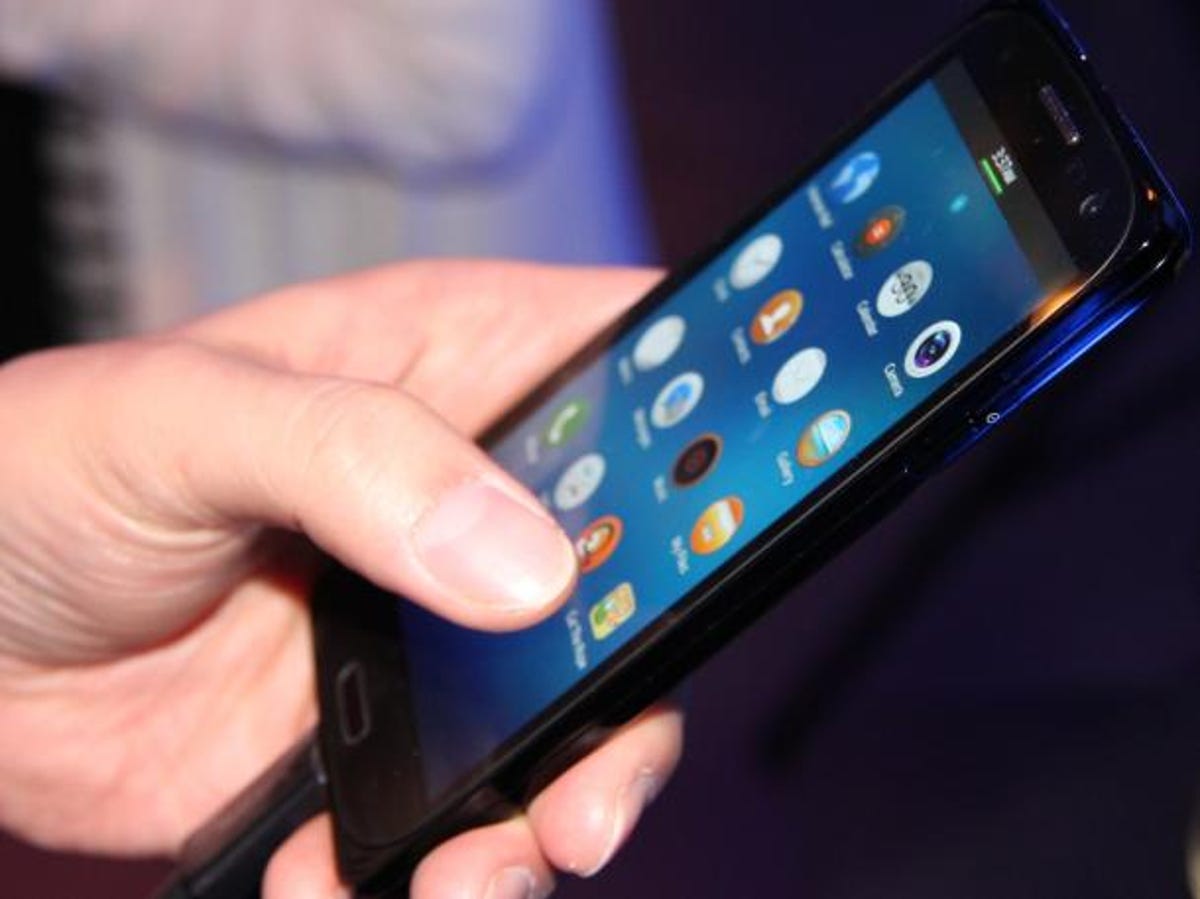SAN FRANCISCO — Android may have dominated Samsung’s developer conference, but that sure didn’t stop Tizen from making its quiet pitch.
Samsung hosted it first conference for app makers on Monday and Tuesday in San Francisco. The vast majority of sessions and talks focused on Android-based devices, but Tizen, the open-source operating system being developed by Samsung and Intel, made its own low-key appearance.
That presence wasn’t through a high number of presentations or speeches by Samsung — or really any public mention by the Korean electronics giant at all. Rather, Tizen popped up in discussions between developers, in pitches by Samsung partners, and in incentives offered to app makers. The operating system crept into many aspects of Samsung’s show even as the company pushed developers to make Android apps unique to its devices.
Related stories:
- Samsung’s secret weapon in the mobile wars: Tizen
- Samsung co-CEO: We want Tizen on everything
- Samsung delays first Tizen phone to fourth quarter
- Why Samsung needs to woo developers
“The whole conference has got to be seen in the context of Tizen,” Ovum analyst Jan Dawson said. “Samsung is proving it’s good at working with developers so they’ll transition to Tizen when the time comes.”
Samsung is the world’s biggest Android device maker by a wide margin, but it has been developing Tizen as an alternative to Google’s operating system for quite some time. Tizen gives Samsung more control over its own future, allowing it to rely less on Google and more on its homegrown software. That becomes increasingly important as Google puts more emphasis on its Motorola business and as Samsung tries to set itself apart from all the other handset makers in the market.
Development for Tizen hasn’t been particularly smooth. CNET learned in July that Samsung delayed its Tizen phone release by several months to the fourth quarter of this year. Now, it appears that delay could be even longer, with one of Samsung’s partners telling CNET that the latest plans are for a launch in January at the Consumer Electronics Show in Las Vegas. However, that date could change again. Samsung, meanwhile, hasn’t publicly provided any recent updates about its first Tizen phone release. It declined to comment about timing for this report.
Tizen OS early-stage interface and apps examined (pictures)






Tizen’s delay has partially been due to app store issues. The group behind the OS has been working feverishly to garner developer support, holding hackathons and other events in recent months. The next such event will be the Tizen Developer Summit in Seoul, South Korea, in mid-November. But even then, the upstart OS is sure to be well behind other new operating systems competing for developer attention.
Even though Samsung’s developer conference predominantly focused on Android, it gave Samsung and its partners a platform to tout Tizen’s benefits and convince developers to jump on board.


Luke Westaway/CNET
Most app makers that CNET met at the conference said that Samsung or Intel has talked to them about Tizen at some point and that they were interested in learning more about the operating system. However, most of them appear to be taking a “wait and see” approach, preferring instead to devote their limited resources to iOS, Android, or even Samsung’s special flavor of Android. That’s true even for huge companies that have more developers.
“We’re not looking at [Tizen] right now,” said Adam Stein, senior director of mobile marketing for enterprise software giant SAP. SAP makes its own apps but also builds apps for various business customers. “The major enterprises are only interested in three or four operating systems at most.”
That’s something Samsung and Intel realize and will have to overcome. If there’s one thing they’ve learned from BlackBerry and Microsoft, it’s that apps matter. A lot. If popular titles don’t work on a particular operating system, it’s tough for that OS to gain much traction with users. One way Samsung and Intel are trying to attract developers to Tizen is by shifting the focus to HTML5 and away from native apps, partners say.
HTML5 first
HTML5, unlike other codes used for the development of apps, is a Web-based standard, so sophisticated programs can be run using a browser, rather than as a native program on the phone. The major advantage is that, in theory, a developer can build one HTML5 app and have it run on any phone with a good browser. That also means the app isn’t stuck in just one platform such as iOS or Android.
“What Samsung is announcing with Tizen is ‘HTML5 first’ as the means of developing an application,” said Abraham Elias, chief technical officer of Sencha, a company that provides tools for building Web applications. “That allows them to get the reach of developers who are already building on HTML5.”
Sencha is working with developers and Samsung to ensure HTML5 apps work the best they can on Tizen, and Sencha also is helping Samsung develop a “world class and second-to-none” browser for the new operating system, Elias said.
Meanwhile, Alexis Menard and Kenneth Christiansen, two software engineers at Intel, noted during their presentation at the conference’s only panel on Tizen, held Tuesday, that the operating system has various benefits for developers. That includes a “responsive design” that allows the OS to span various screen sizes and APIs for features like the battery.
The panel started out with a sparse crowd, but the room filled up by the end of the session, with about 40 people in attendance. Still, that number lags the attendance at panels for smart TVs and Samsung’s Knox security software where it was standing room only.


Josh Miller/CNET
Money money money
As many OS makers have come to realize, just touting the benefits of their software isn’t enough. For developers, what can really make a difference is funding.
Marmalade, a company that provides tools to port games and apps from one platform to others, announced during the conference that it will offer any developers who agree to make a Tizen app with its technology a free Tizen phone, a free Marmalade license, and up to $1,000 in “additional prizes.” It’s launching the program as part of a partnership with Samsung.
Nick Lambert, a marketing associate at Marmalade, said he signed up about 10 developers to Tizen on Monday and about 20 on Tuesday. In comparison, Samsung said about 1,300 developers attended its conference. Of course, many others could be working directly with Samsung or Intel or collaborating with another partner. But it sure doesn’t indicate that interest is widespread.
AppBackr is doing something similar, paying developers with funds from Intel. It works with companies like Marmalade and Appgyver to attract app makers, and its cash incentives range from about $10 to more than $10,000, depending on the importance and AppBackr ranking of the app.
“We pay out [the funds] when an app gets verified on the Tizen store,” said Sarah Cornwell, director of marketing at AppBackr. “It happens pretty fast now, within about 24 hours.”
But not even cash is enough in some situations. A big drawback for developers is that Tizen won’t be offered in the US, at least not at first. And there’s also a lot of confusion about the platform. Samsung has said it will release Tizen as the operating system for a high-end phone, but many developers believe the software will be geared at cheap, mass-market smartphones. That disconnect doesn’t help the Tizen group’s efforts.
Han-Shen Yuan, senior director of engineering for new ventures and innovation at eBay, said his company is “currently evaluating” making a Tizen app because it believes the operating system could be popular in emerging markets. He added that even if Samsung first pushes the software for high-end devices, eBay still is interested as the focus likely will change over time.
“Tizen is interesting to us because if it’s going to reach a large penetration from a mobile perspective, we want to be on a ‘everyman phone,'” Yuan told CNET. “Part of our discussions is really looking at how this expansion is going to occur.”
For Samsung’s first Tizen phone to succeed, it better hope many more developers get interested pretty quick.



